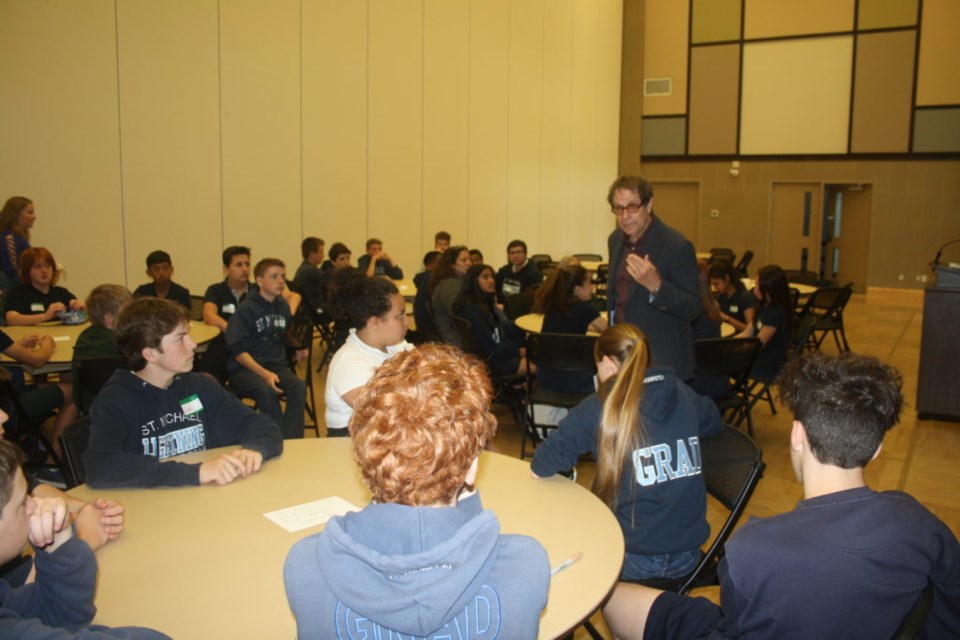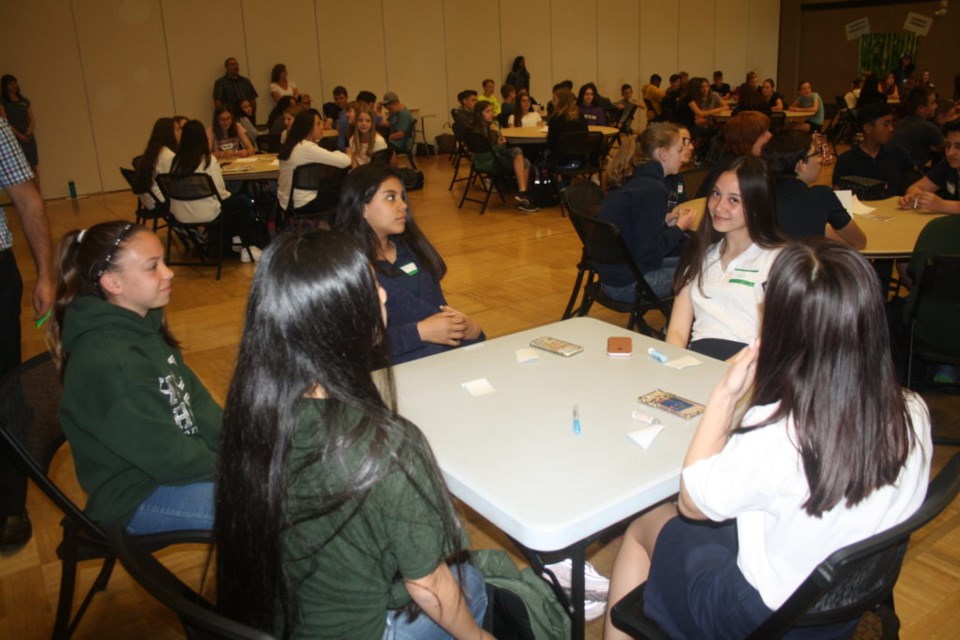
Dr. Ron Clavier had a message to share with Grade 8 students Monday. If you want to be the best you can be, turn off your cell phones.
He’s not the first to suggest screen time, including phones, TV, computers and iPads, should be limited to two hours a day. However it may have been the first time the young teens from Crossroads, St. Michael and St. Davids elementary schools had a brain scientist tell them why.
The occasion was a Grade 8 Mental Health & Wellness Conference, organized by the Lord Mayor’s Youth Advisory Council members with help from Town staff, and held at the community centre.
Clavier, a neuroscientist, psychiatrist and psychologist who specializes in teen’s mental health, has been acting as an advisor to the advisory council, attending meetings and offering assistance — he says he steers away from giving them advice, but prefers to share information that helps them make choices.
That was also the way he handled his presentation on cell phones, screen time and sleep deprivation, which affects many teenagers — he said he wouldn’t tell them what to do, but would give them the information they need to make their own decisions.
The kids were asked to turn off their cell phones for the day — eliciting several groans in response — but Clavier said he wanted them to experience the discomfort of being without their phones, a signal they use them too much.
Then he explained the importance of getting sufficient sleep to recharge the chemicals in the brain that have been depleted during the day. Those chemicals are fuel for the brain, he said. “If you didn’t get enough sleep, you may start the day without enough of the fuel you need. Starting off the day with half a tank of gas means you’ll run out of it. At the end of the day you’ll be running on low.”
Teenagers need about 10 hours of sleep, and most get about six hours, he said.
The solution is, “go to sleep earlier. It’s simple, it works. Turn off your phone, turn off your devices, let the room get quiet, and go to sleep.”
But although it’s simple, he said, “that doesn’t mean it’s easy. It isn’t.”
Turning off electronic devices “allows you to have the future you want. I don’t want to see you short-changed in your ability to do what you want, that could have been avoided. I don’t want you to say ‘why didn’t someone tell me when I was 13 or 14?’”
He asked them to think about what they are giving up — in study time, the ability to focus, to be “in the zone” to be able to learn. When they are distracted by their devices, he said, they won’t remember what they’re studying and they won’t learn what they need to learn to be the best they can be.
“If you’re using screens five, six, or seven hours a day, you’re going into an area where you could be damaging your brain, and that damage is permanent.”
He dispelled the myth that humans don’t need all of their brain cells. “That’s not true. I’m a brain scientist, and I’m telling you we need all of our brain cells. We can’t afford to lose any. Seven hours a day will make you lose brain cells and you don’t get them back.”
He spoke of athletes, artists and surgeons who get into the zone they need to perform, “but if the phone rings or there’s a knock on the door, that feeling is broken.”
You don’t get back into the zone without going back to the beginning, he said. “You can study for three hours and not learn a thing if your phone was on and you were being interrupted.”
He also talked to the teens of the importance of relationships. “We need friends, family, classmates, teammates — the brain needs that to be healthy.”
Screens, he said, “take away a little of our humanity.”
He suggested students ask their parent to also give up some of their screen time, and to do something together. “It doesn’t have to be angry, but don’t let them off the hook.”
Each group of students had the opportunity to sit through four breakaway sessions. In addition to Clavier’s workshop, there were two members of the Region’s public health department leading sessions, one talking about vaping, including health and legal issues, the other about nutrition and the relationship between sugar and marketing. Karen Post from Red Roof Retreat led the fourth with a vision board exercise on mental wellness.
Clavier closed the conference with a short keynote address on anxiety.
While parents do a great job of talking to kids about physical changes of the teen-age years, nobody is talking to them about the changes in their brains and their emotions, he said, which can be even more devastating — kids think something’s wrong with them, and that leads to problems.
“It’s cruel not to give kids a heads-up,” he said. “We don’t want that to happen.”
Cutline: Several students left their cell phones on the table during the Mental Wellness Conference workshop, but didn’t pick them up. (Penny Coles)
